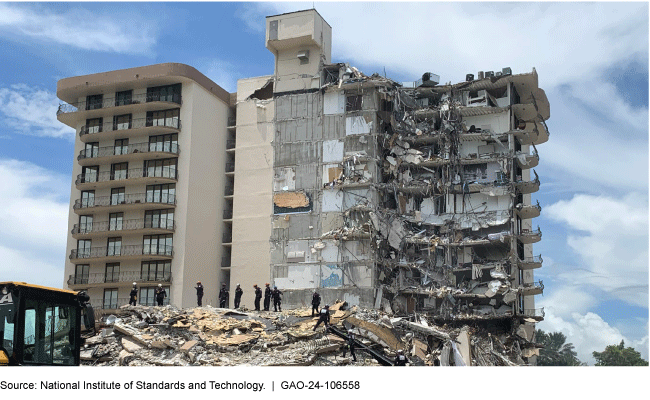Disaster Assistance: Information on the 2021 Condominium Collapse in Surfside, Florida
Fast Facts
The partial collapse of a 12-story beachfront condo in Florida was one of the deadliest structural disasters in American history—killing 98 people and injuring many more.
This Q&A report looks at the federal response. FEMA coordinated response and recovery efforts, including assistance for survivors and victims' families. The National Institute of Standards and Technology is investigating the technical cause of the collapse and plans to issue a report in 2025 that may recommend changes to improve the structural safety of buildings.
We also determined that FEMA grants can be used for disaster-resilience efforts for condos.
Site of the 2021 Champlain Towers South Collapse in Surfside, Florida

Highlights
What GAO Found
The partial collapse of the 12-story Champlain Towers South condominium in Surfside, Florida, on June 24, 2021, is one of the deadliest structural disasters in American history. Ninety-eight people were killed and many others injured. The Federal Emergency Management Agency (FEMA) is the primary federal agency responsible for coordinating the response and recovery to this emergency. As of June 2023, FEMA had obligated about $106.9 million in response to the collapse. These funds supported survivors and other individuals affected by the collapse and state and local response and recovery efforts.
To determine the technical cause of the collapse, the National Institute of Standards and Technology (NIST) launched an investigation. NIST's investigation is ongoing, and the agency plans to publicly report its findings and any recommendations in 2025. As of June 2023, NIST had obligated about $15.4 million for its investigation. In addition to NIST's technical investigation, the Miami-Dade Police Department and the Town of Surfside are also investigating the cause of the collapse.
Following the collapse, questions have been raised about the potential for FEMA to recover assistance costs for this emergency. Federal law allows FEMA to recover costs for emergencies or major disasters that were intentionally caused. When determining whether to pursue recovering such costs, FEMA considers various factors, such as whether an intentional act can be shown and the time and cost of litigation. As of January 2024, FEMA has taken no action to recover costs related to the collapse.
FEMA has several hazard mitigation assistance grant programs and a revolving loan fund program that could be used to improve the disaster resilience of condominiums. For example, the Hazard Mitigation Grant Program has provided funding to assist communities with condominium acquisitions, landslide stabilization of condominium buildings, and purchasing generators, among other things.
Why GAO Did This Study
GAO was asked to examine aspects of the federal response to the Champlain Towers South collapse. This report provides information on FEMA and NIST obligations in response to the collapse, the factors that affect whether FEMA attempts to recover federal assistance costs, the entities investigating the cause of the collapse, and whether FEMA grants can be used to increase condominiums' disaster resilience. To conduct this work, GAO analyzed agency documents and FEMA and NIST data on federal funds obligated in response to the collapse. GAO also interviewed officials from FEMA, NIST, Miami-Dade County, and the Town of Surfside.
For more information, contact Chris Currie at (404) 679-1875 or CurrieC@gao.gov.
